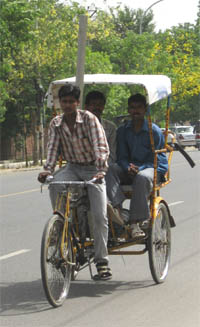Apr 19, 2024
Apr 19, 2024
It's a hot summer day. Nisha Rana, 30, alights from the bus. After a tiring day at school, teaching geography, Rana, finds it difficult to walk beyond half a kilometre. So she hails a cycle rickshaw, whose driver agrees to ferry her home for Rs 5 (US$1=Rs42). "These rickshaws are a boon in a place like NOIDA (New Okhla Industrial Development Area), where one hardly finds auto-rickshaws and where buses don't ply on every road. Cycle rickshaws are a cheap and non-polluting means of transport," she says. However, the recent Delhi High Court and Municipal Corporation of Delhi (MCD) rulings that prohibit cycle rickshaws from plying in Chandni Chowk (Old Delhi) and other arterial roads may just put a spoke in Rana's daily return journey.
The court imposed this blanket ban citing that cycle rickshaws are the chief cause of traffic jams in the city. But many would beg to differ. "Delhi's ring roads, where no rickshaws ply, see the maximum number of traffic jams," refutes Nalin Sinha, Programme Director, Initiative for Transport and Development Programme (ITDP). An NGO, ITDP introduced colorful, lightweight cycle rickshaws around the Taj Mahal to provide pollution-free transportation. The initiative was part of the Adhunik Cycle Rickshaw Campaign.
 According to a study conducted by ITDP, there are over 800,000 cycle rickshaws plying in various residential areas of the Capital. They cater to millions of women, elderly people, school children, traders, shopkeepers, the physically challenged and other commuters who wish to travel over short distances and for a nominal fare.
According to a study conducted by ITDP, there are over 800,000 cycle rickshaws plying in various residential areas of the Capital. They cater to millions of women, elderly people, school children, traders, shopkeepers, the physically challenged and other commuters who wish to travel over short distances and for a nominal fare.
Take the case of Arunima (5) and Anoush (7), who depend on Gore Kumar, 27, their rickshaw 'wallah' (man who steers a rickshaw), to ferry them to and fro from Shradhanand Public School in NOIDA. "The rickshaw is the cheapest and the safest mode of transport for our children," declares their mother, Ratna Malhotra.
"While there is a school bus, we decided to rely on the rickshaw as the school is nearby and the rickshaw is cost-effective," she elaborates.
With the increase in population - be it in infrastructure-deprived Gurgaon or in NOIDA, which is bereft of any reliable form of conveyance, or in the Delhi University area where the Metro (intra-city railway) has changed the way people travel, the ubiquitous rickshaw 'wallah' still comes to the rescue of stranded commuters. A trip to the local market, a visit to a friend in an area far from the bus stop, or to go to the nearest Metro station - the common man depends on the cycle rickshaw. Unfortunately, the court ruling has had a repercussion on 15 million people in Delhi.
However, probably the worst affected by the ban are the seasonal migrants. Says Shankar, a rickshaw-driver who hails from Bengal, "The rickshaw is a good way to earn some extra income in the off season. I manage to earn around to Rs 100 to Rs 200 a day. I also manage to send some money home."
Adds Sinha, "Most rickshaw-drivers are self-employed migrants. Banning rickshaws would mean rendering almost 10 million people unemployed." According to the ITDP study, most of the rickshaw-drivers are unskilled and uneducated or are landless farmers. Of this group 68 per cent belong to the Other Backward Classes (OBC) and 20 per cent to the SC/ST category.
The study also indicates that the ban would lead to an increase in motor vehicles and a subsequent increase in air pollution, accidents and a crisis for parking space. "ITDP has requested the court that instead of banning cycle rickshaws, efforts should be made towards finding a way in which it can be best integrated with our city transport system," says Sinha.
However, the recent ruling is not the only one that has impeded the pedal. According to the Cycle Rickshaw Bye Laws 1960, Section 17 a, any cycle rickshaw found plying for hire without a licence shall be seized by the commissioner and destroyed.
"In many cities around the world, cycle rickshaws are one of the most cherished means of transportation. In Zurich (Switzerland), 80 per cent of the population uses cycle rickshaws. Rickshaws are a common means of transportation in places like Singapore. I wonder why they are under threat in India," Sinha says.
02-Jun-2007
More by : Elsa Sherin Mathews